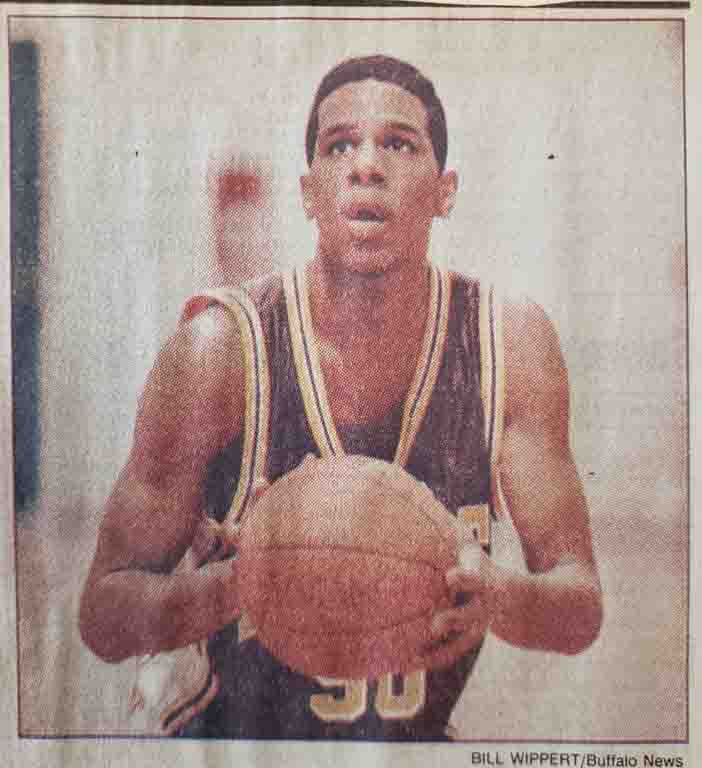
The first principle of my blog is “Creating Ecosystems of Success”. A key aspect of creating them is hearing the stories and experiences of those who have made it to where we want to be. Like many kids, an early dream of mine was to play basketball. That dream didn’t reach fruition, but the lessons I learned playing in Section VI, the New York State Public High School Athletic Association’s western-most section, laid the groundwork for me to go on to further my education and start my career in science.
I am currently working on a project chronicling my early basketball journey. It is called The Engineers: A Western New York Basketball Story. As a part of the research for that project, I’ve interviewed numerous Section VI basketball players and coaches from my era. On September 26, 2018, I had the honor of interviewing Carlos Bradberry – one of the many great guards in Coach Pat Monti’s LaSalle basketball dynasty. Carlos was the floor general for the Explorers following Michael Starks and Modie Cox, and then prior to the ascension of Tim Winn, Jody Crymes and Terry Rich.
In part one of this two-part interview Carlos discusses his background, how he started playing basketball, and how he became one of the legendary point guards in Section VI and the LaSalle basketball dynasty. The pictures in this interview come from an archive of Section VI basketball, carefully assembled over the years from issues of the Buffalo News, the Rochester Democrat & Chronicle, and Section V and VI playoff programs by my first Coach at Hutch-Tech High School, Dr. Ken Jones. Other pictures were generously shared by Carlos himself, and his Head Coach at LaSalle Senior High School, Pat Monti. Click on any of the images to enlarge them.
Anwar Dunbar: Hello, Carlos. First, thank you for telling your story. As you know I wrote some pieces on Coach Monti and Tim Winn. I’m a blogger and, as you may also know, I’m writing a book about my high school basketball experience and what that taught me about success and failure in life. The experience of high school basketball was my first attempt at effecting a personal goal and it set the stage for everything else.
To make the story as authentic as possible I wanted talk to some of the other Section VI players from that era – teammates and opponents to see what their experiences were. This is relevant because LaSalle was the premiere program in Section VI for 10-12 years and for a stretch of that, you were the guy. Also, when I started this project, I actually said to myself, ‘It would be great to interview Carlos Bradberry,’ as you were a member of the ‘All-Western New Your First Team’ during my sophomore and junior seasons.
Before we start, I have a quick story. We played your team in the 1991 Festival of Lights Tournament in the opening round. You guys handled us by about 30 points (laughing). My story is one of discovery, so I was literally figuring everything out as I went along. The day before the game, just after our Coach gave us the scouting report, one of my teammates said as we were leaving the gym, ‘We’re not going to beat LaSalle!’ I wondered how he could say such a thing. The next day as the game gradually unfolded, I saw his point (laughing). I remember you slashing to the basket repeatedly, and the announcer calling your name repeatedly. I developed a respect for you after that game and kept my eye on what you were doing.
With that, let’s start. Where is the Bradberry family from? Are you all from Niagara Falls or somewhere else?
Carlos Bradberry: My grandfather is from Alabama, but we’re for the most part, from here.
AD: Don’t you have an older brother named Cazzie?
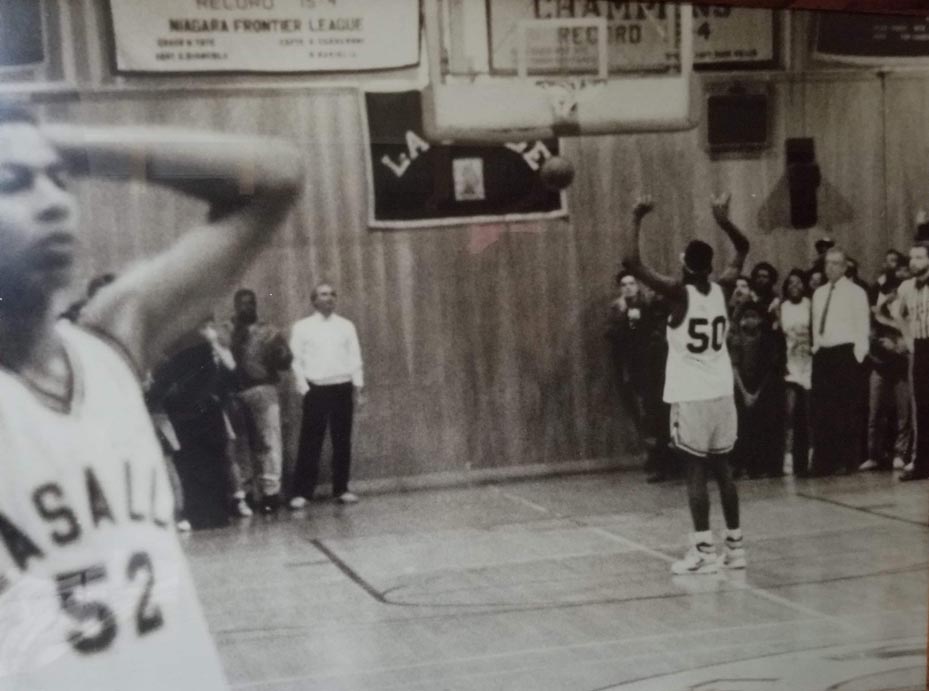
CB: Yes. Cazzie is two years older than me. He graduated with Modie Cox, Scotty Rose, and Anthony Wallace – those guys.
AD: How old were you when you started playing basketball?
CB: I was eight or nine when I started playing in the Boys Club, which was a ‘rite of passage’ for everyone in Niagara Falls back then. It was the only thing going on. If you were anybody playing basketball, you came through the ‘Biddy Leagues’ or the Boys Club. I played for the actual Boys Club team.
AD: Was your Dad a basketball player? Did you see your older brother play and wanted to play as well, or did you just naturally want to play?
CB: I think my Dad was a good high school football and basketball player. My Dad’s playing days were done by the time I became interested in basketball. Our whole family, including my cousins, was a basketball family and I just grew up watching basketball.
My Dad used to take us to high school games when Trott-Vocational was really good back in the day. We’d go to see Trott and Niagara Falls play. That’s what really got me going and it was just a family thing. Basketball was it for my cousins and me. My cousins always played, so I was always playing with them.
AD: I think I saw in one of the Buffalo News stories that there was a Niagara Falls Senior High School player who also had the last name Bradberry. Did you have a cousin over there?
CB: I had two cousins over there – Darien and Cortez. They graduated the same year as my brother in 1991.
AD: This is fascinating because what I’m gathering is that Niagara Falls was a much smaller community compared to Buffalo which had 14 high schools and the city was bigger, so not everyone knew each other. It sounds like you guys all knew each other, and you were all playing together, even before you got to the high school level.
CB: Yes, everybody knew each other, and everybody played together. Growing up I didn’t know where I was going to play because of how they had the school districts sectioned off. I lived within walking distance to Niagara Falls Senior High School, but they bused us to LaSalle.
I was a LaSalle kid and it was miles and miles away from my house. I didn’t really know until I reached middle school – I went to LaSalle Middle School instead of Gaskill. Gaskill was the other middle school at the time, and it still is.
AD: What was it called?
CB: Gaskill. So primarily those kids went to Niagara Falls Senior High School, and the LaSalle Middle School kids obviously when to LaSalle Senior High School.
AD: I discussed the Biddy Leagues with Tim Winn. We had middle school teams in Buffalo, but it sounds like Niagara Falls did not have those. And so everyone played in the Biddy Leagues until you were ready to play in one of the two Junior Varsity (JV) programs. Were guys getting quality coaching in the Biddy Leagues or did they just throw the balls out there and let you run around?
CB: It’s funny. We always had the older guys who knew basketball. I know that Mike Hamilton, who is a referee now, coached me primarily when I was in the Biddy Leagues. He’s a real ‘basketball’ guy. There was the Boys Club, the Thirteenth Street Center, and there was another community center – so there were three to four centers and all of them basically had basketball guys in those positions. It wasn’t just guys showing up off the street and wanting to coach their kids or something.
AD: That’s fascinating, because I think the coaching, we had in Buffalo was really varied. Which players did you look up to in college or pro?
CB: I’m showing my age here but growing up I was a huge Dr. J guy when I started watching basketball, and then I was a Jordan guy obviously. Allen Iverson was more my age, so he was my favorite player once I got older. But at the time I didn’t know much about him because we were around the same age. I also have a weird one. My favorite college player was Greg Anthony. Most people would say, ‘Who?’ Greg Anthony was my favorite player back when the University of Nevada-Las Vegas (UNLV) had those great college teams. I wore number 50 which was an odd number for a guard, but that’s why I wore that number in high school.
AD: Yes, I remember you wearing that number. So, you had your eyes on the college teams. That’s interesting because Tim told me that he had his eyes on the Niagara Falls high school basketball teams, for the most part.
CB: As far as when I was younger, Modie was a couple of years older than me, so he was more like a peer. There was a guy named Mike Starks who played for LaSalle – he was amazing and one of the best guards that no one ever talks about. When I started going to LaSalle games, I was in the sixth and seventh grades. Me and my buddies would just go to games. We wanted to be the next Mike Starks. He was the guy that I looked up to around here basketball-wise.
AD: What was special about Michael’s game? Could he do everything?
CB: Man, he could do everything. He was 6’3”. He could jump, he could shoot, and he could handle the ball. He was the point guard and his game was rare back then. Your point guard was the guy to set guys up, but man he could shoot, he could get to the basket, and he could jump – he had the whole package.
AD: Okay. So that was the 1988 Class B Federation Championship team. It was loaded then because they had guys like Eric Gore.
CB: Yes, Eric Gore, Frank and Michael Starks, Elon McCracken, and Modie (he was young).
AD: Well obviously, you had Christian Laettner in the Niagara Frontier League (NFL) then, but were you aware of any of the Buffalo guys like Ritchie Campbell and Marcus Whitfield?
CB: Ritchie and Marcus were the two guys I’d always hear about in seventh grade and that’s when I started to play for LaSalle. Those dudes were amazing!
AD: And the JV team – Coach Rotundo oversaw that?
CB: Yep.
AD: Early on, what kind of player were you? Coach Monti described you as a ‘scoring’ guard. Were you that right away or did you have to grow into that role?
CB: I always thought I was a scorer and that was always my mentality, ever since I was younger. In my freshman year, I started on the JV team and was moved up midway through the season to play on the Varsity team. I knew that I wasn’t going to be a bigtime scorer on the Varsity level as a freshman or as a sophomore, because we just had so many senior guys.
I was a starter, but Coach Monti let you know your role. It’s something that’s lost today. Kids don’t have roles today and everyone thinks they’re a scorer and a star. I had to earn my minutes and if I got an open shot, I was happy because I knew that it was Modie’s, Milo’s, and Duke’s team, and I was there to play my role.
AD: What was your role? Was it to play defense on the other team’s best guy?
CB: No, I wasn’t the greatest defender, especially when I was in the ninth grade (laughing). He brought me in for offense as a freshman and I may have averaged around nine points a game or something which was decent back then. He basically brought me in and let me know that, ‘Hey, you’re basically here to score when the chance comes,’ so more than anything I was there to help offensively.
AD: Talk about playing for Coach Monti. After talking with him, I got the impression that he was very, very intense.
CB: Oh yeah. Very intense. Intense, but giving great attention to detail was his greatest asset. You never went into a game unprepared. You knew what was going to happen and you were either prepared through game plans he spent a bunch of time on, or you were prepared because of what we practiced and worked on every day.
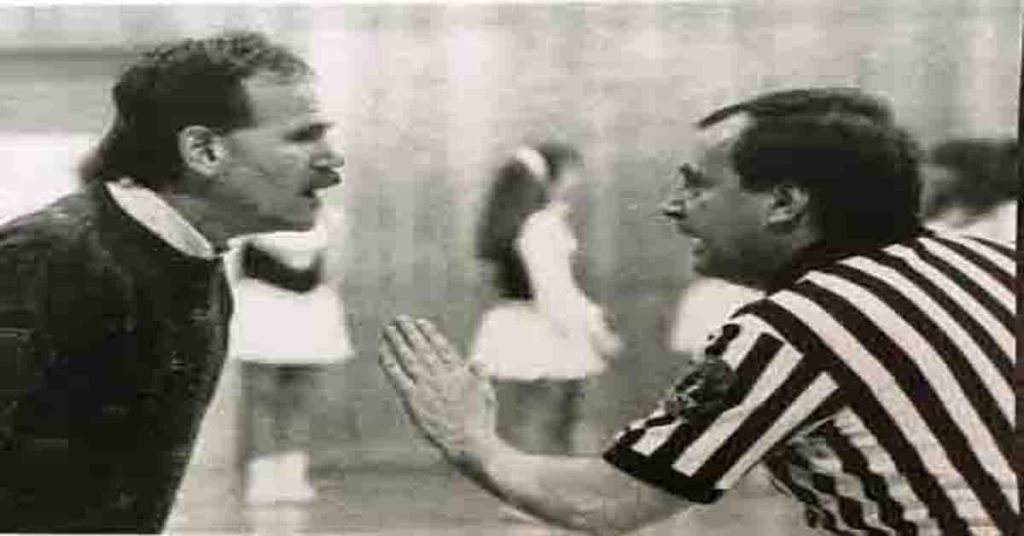
There were things that he did that had me college-ready that I know other high schools weren’t doing at that time like defensively, positioning off the ball, how you play ‘one pass away’ and ‘two passes away’. Coaches around here weren’t teaching that. Everything was tight. Again, not knocking any of the college coaches. I played at two Division I schools and I always say that Coach Monti was the most knowledgeable coach that I’ve ever played for!
AD: Wow. Well let’s talk some ‘Xs and Os’. You said that you were brought on as a freshman and your role was to score. Coach Monti described LaSalle’s offense as unselfish – everyone sharing the ball. Tim basically did too. From the outside looking in, you seemed to be the featured guy. Were you guys running a ‘motion’ offense or were you running an ‘isolation’ for someone?
CB: I know it changed during Tim’s years and he let those guys ‘freelance’ more. Basically, our main offense in my freshman through my senior years was called “Flex”, which is a ‘dinosaur’ offense now, as no one really runs it anymore. It’s about ball movement, body movement, setting picks for each other. You were working with each other and there wasn’t a lot of ‘one on one’ stuff. It was basically five guys working together, and it was weird when we wouldn’t get open looks. Flex was one offense, but there were a million different ‘wrinkles’ in it.
So, it wasn’t like, ‘Okay here’s this one offense and if this one thing doesn’t work we’re shutdown.’ It was more like, ‘Okay, they took this away, so here’s the next option…..’ There were always four to five options to that one set where something was going to be open. That was our base offense for four years. We did a little bit of some other things, but we spent a ton of time on Flex and its different options and it worked for us.
AD: Before we move on, you got moved up as a freshman. Were all the guys you graduated with in the same group? I’m referring to guys like Curtis Ralands, Chris Frank, Todd Guetta and O’Neal Barnett – all the guys who were on the Varsity team when you were a junior and a senior. Were all of you on the JV team and you got moved up first? Or was it a gradual thing?
CB: I went up in the ninth grade. I don’t think the other guys came up until the eleventh grade. Shino Ellis may have played on the Varsity team in the tenth grade if I’m not mistaken – he was a year older than me. Todd, Chris, Curtis and those guys all came up in the eleventh grade. Curtis came over from Niagara Falls Senior High School, which was a boost for us. He played JV there and then ended up at LaSalle in the eleventh grade.
AD: What was so special about Curtis coming over? I remember the goggles, the bald head, and the intensity, but what would you say was his major contribution?
CB: Curtis was like our ‘enforcer’. He brought toughness to our team. He didn’t care if he scored 1 point or 20. He was going to do all the dirty work: rebounding the ball, defending and taking charges. He was definitely a Dennis Rodman-type.
AD: So you had your role as a freshman. Was it the same as a sophomore or did Coach Monti give you more ‘leash’?
CB: As a tenth grader I started the whole year. I had more leash, but it still obviously wasn’t my team. That year Modie, Cazzie, Scotty Rose, Anthony Wallace and myself were the starting five I believe. I had a larger role on offense and I think I was depended upon more to score because Modie was our guy – he was great at distributing – he was a pure point guard. If you ran the floor, you were going to get a bucket. Scotty played a lot more ‘down low’ and was probably our second leading scorer after Modie. On the wing I think I was our next guy, so I had a much bigger role in my sophomore year within the offense.
AD: That’s awesome. So, you got a lot of quality minutes early on. Were you there against Lancaster, and in the Far West Regionals against schools like East and McQuaid?
CB: Our 86-57 loss to McQuaid was the worst I’d ever taken in high school.
AD: What was so bad about it? Did you guys just have an off day?
CB: We had an off day and they had the big 7’ kid – I think his name was McKinney or something. They had size, but they also had these guards who were coming down and pulling up a step beyond NBA range. We just weren’t seeing that in our area in Section VI. It almost seemed like the perfect game for them and the worst game for us. Anything they shot up went in and it just snowballed on us. It was the worst game I’d played in as far as taking a loss in high school.
AD: So that was your sophomore year. Before you talk about your junior year, what kinds of things were you guys doing in the offseason? I know that was before Amateur Athletic Union (AAU) basketball got big.
CB: I can’t remember if I went to a camp that year or the next year. It was more so playing locally. There was the big travel-AAU type of thing. We’d go down to Philadelphia and play against Rasheed Wallace who went to North Carolina, and the Jason Lawson kid who went to Villanova. The Public Athletic League (PAL) tournaments used to be huge back then. The Head Coach at Niagara Falls High School now, Sal, was the one taking us on all the PAL trips back then. You played Division I guys from other cities, and that was sort of our AAU-thing back then.
AD: You said Sal?
CB: Yes, Sal Constantino. He was the PAL guy who took us on those trips to the big PAL tournaments back then which were huge.
AD: Going into your junior year, Modie and his fellow seniors graduated so it was basically your team. What was your mentality going into that year?
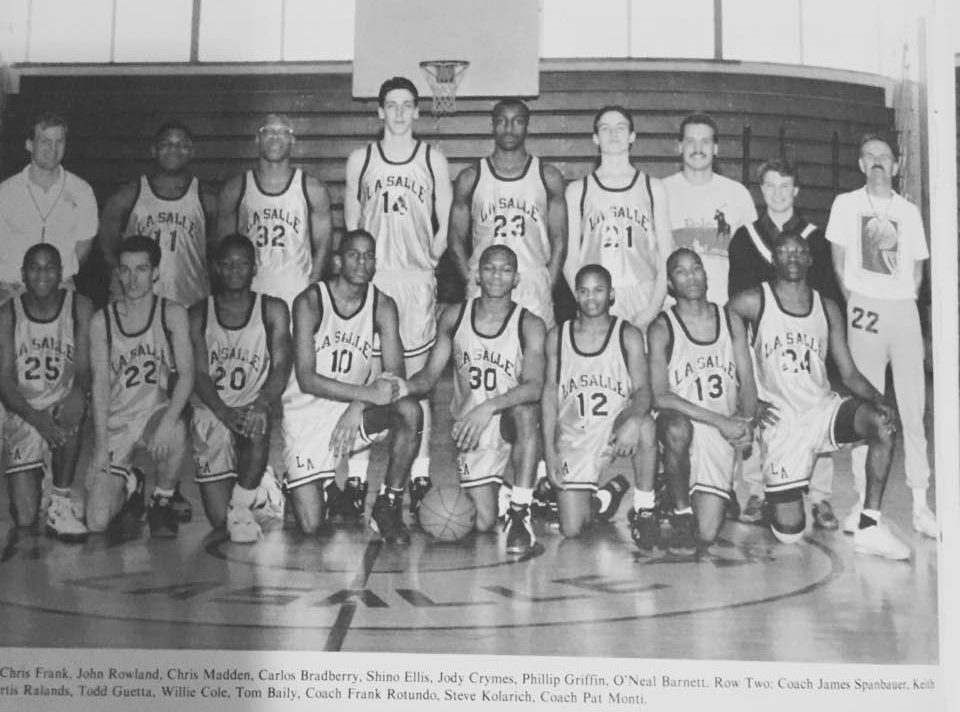
CB: I knew what we had, and not being cocky, but I thought we were going to be very good. A lot of people didn’t know what we had, but I knew. We had Shino, Todd, Curtis and Chris Frank – we had guys who could play basketball. But our Varsity program was so good that those guys didn’t get a chance to play yet. Our JV teams were awesome, they got awesome coaching and they came out of the system, so we had guys who could really play basketball. Now, we wound up losing only one game. I didn’t think we were going to be that good, but we had a good run until we played John Wallace.
AD: Okay, we’re going to get to John Wallace and Greece-Athena shortly (laughing). Your team ran mostly the Flex offense, but it seemed like you were the guy. You were LaSalle’s leading scorer. Was that just something the team understood – that you would be the number one option – or did Coach Monti make that explicitly clear from day one?
CB: Coach Monti made no reservations about letting guys know their roles. It was, ‘Shino and Carlos are going to be our two scorers and everyone else is going to fit in where we fit them in!’ We had a guy named O’Neal Barnett who knew that he was going to come in and defend our opponent’s best guy. Some nights he’d score 2 points and some nights he’s score 10 points, but he could care less. He knew that he was going to come in and lock down our next guy and he was fine with that.
We had Curtis who knew that he was going to come in and just grab every rebound. Coach Monti would have talks at the beginning of the year, and the middle of the year. There wasn’t any question of who was going to be doing what or what their role was. It was laid out and you knew what was going to happen.
AD: Wow. So everyone accepted their roles.
CB: Yes, everybody bought in and I think that’s just because of the success of the program. If you’re winning every year, it’s easy to sell that to kids. If he was losing every year, I don’t think it would’ve happened.
AD: So you guys went on to go 23-0. You beat us, and you started that year winning the Corning Cup in Albany, NY and, Carlos, I’ve got a funny story. Were you a trash-talker? The reason I’m asking is because in the Class B-1 quarterfinal in 1992, we matched up with the Niagara Falls Power Cats at LaSalle’s gym. In the lobby, the trophy case had individual polaroids of you and your teammates standing there posing in each of photos because you were undefeated at that point and riding a lot of momentum.
One of our seniors – this a true story – saw your picture in the case and he said, ‘Man. I can’t stand that Bleepedy-Bleep!’ I looked at your picture and I looked at him, and I said to myself, ‘This person must’ve have been guarding Carlos Bradberry when we played LaSalle, and maybe Carlos was jawing at him.’
CB: Yeah, (laughing) I was, and I forgot to mention that another one of my favorite players was Gary Payton. You watch him play and you’re going to pick up some things from him. It’s funny because Coach Monti used to say that I was this quiet and reserved guy, but once I got on the court it was different. I was a different animal and I’d consider myself a trash-talker for sure.
AD: Now, was that you or was Coach Monti rubbing off on you? I got the sense that he was very, very confident and I imagine that was contagious.
CB: I think it was just me. It was never predetermined or preplanned, and once you get into that moment you get so focused and lose yourself on the basketball court. I was raised with a bunch of uncles and cousins who were hard on me. We went to the basketball court and they’re talking junk to you, they’re beating up on you, and you learn how to be tough and not back down and that’s how it manifested itself for me.
AD: In the 1992 Class B-1 Sectional Final at UB’s Alumni Arena, we had just lost to Grand Island and as we were exiting the court, your team came charging out in a single-file line. You were at the front, and I remember reaching out and ‘dapping’ you up. You had the ball in one hand, saw me and we slapped hands and then you went into your pregame warmup before going on to defeat Williamsville North that night 62-52.
After defeating Williamsville North, your team advanced to the Far West Regional against Section V’s Class A Champion, Greece-Athena from the Rochester area. They were also 23-0 and they were calling the game the “Meeting of the Perfect Strangers”. Rochester is basically our ‘sister’ city and it’s only an hour away. Did you know about John Wallace ahead of time?
CB: I heard of him, but social media wasn’t big back then so I may have heard his name, but I didn’t know him like that until Coach Monti showed the video and we started to scout for them and I was like, ‘HOLY COW!’ It was ridiculous what you were watching. But no, I didn’t really have a beat on the Rochester and Syracuse guys. I just knew the Niagara Falls and Buffalo guys.
AD: So the team was able to watch the film before the game. What stood out to you?
CB: He was dunking on everybody. He was blocking everybody’s shot. For me it was exciting because I knew that we would get into it at some point during the game, because it was in my competitive nature and his. We did get into it at some point, but I hadn’t played against anything like that personally in our area. We didn’t have a guy like that, so seeing him on video – what he was doing at 6’9” was ridiculous. Back then, 6’9” guys weren’t popping out shooting jump shots like he was, and going ‘inside-out’. I just knew we were going to have our hands full.
AD: Yes, there weren’t any big men like that here. Well actually, weren’t Kevin Sanford and Eric Eberz at that level?
CB: Yes, Kevin was close. Maybe I played against him in a few leagues, but I never played against him in a real high school basketball game and didn’t see him much. So it was just different seeing that.
AD: Leading up to the game, did you have ‘butterflies’? Or did it feel like this was just another game?
CB: I think our whole team was confident, but we all had butterflies every single game. That game was no different and I think we all went in thinking that we had the game plan and that we would win it. Somehow someway we were going to make it happen. We did for a half (laughing).
AD: When you guys went out for the jump ball, you saw that he had “DA MAN” cut on the back of his head (laughing). You know what’s funny, is that both Coach Monti and Tim Winn mentioned that with a bit of snark. So the fact that he cut that on the back of his head, even 25 years later, really seemed to stick with them. In general, did that strike you as being arrogant?
CB: Oh, I was pissed off and Coach Monti made a point of it too. He’d play mind games with us to piss us off. He’d say, ‘Look at this guy. He’s got DA MAN on the back of his head!’ I was ready to go nuts just when I saw him. I was thinking this dude thinks he’s really that guy. I got enraged before the game because we were all sitting in the stands watching the game before ours and he’s laying down sleeping in the stands! I’m going nuts saying, ‘Look at this dude, he’s over there sleeping, and he’s got play us!’ Everything he did made me go sort of nuts, but he backed everything up though.
AD: One last question about the game. As Coach Monti pointed out, you guys were right there with Greece-Athena for three quarters and it was close. What happened?
CB: As I remember it, and Coach Monti probably has a better memory than me, I think we were either down two or tied at the half and I know that at that time Greece-Athena was playing us in a regular “man to man” defense. If they had done that for the rest of the game they would’ve lost. At the half, I think we had 27 points. I had 10 points and Shino had 15, so we had 25 of our 27 points.
Their Coach did a great job and came out in a “Triangle and Two” on Shino and me, so we didn’t score a point in the second half; they basically took us away. Our other guys got the open looks and shots we wanted, but they just didn’t fall. Their Coach wasn’t going to let Shino or me win that game that night. I kicked myself numerous times afterwards wondering what I could’ve done to be more aggressive and if Shino and I could’ve done more. But the fact of the matter is that it was a good move for their Coach and it worked out for them that night.
AD: You know, I taped that game. I watched it at home and, unfortunately, didn’t go. After watching it and thinking about how you guys beat us handily all summer long, I thought about how I wanted to get on the court and play against you the next year. First, I got injured and secondly, they flipped the brackets. So we opened against Niagara Falls Senior High School in the Festival of Lights Tournament. They narrowly beat us and you played them again while we played in the consolation game again against Bennett. I’m not sure how much of a difference I would’ve made (laughing), but I was at least looking forward to getting on the court with you.
In part two of this interview, Carlos talks about his senior year at LaSalle, his college career, and then life after basketball. Thank you for taking the time to read this interview. If you enjoyed it, you might also enjoy:
• Niagara Falls basketball legend Time Winn discusses playing in the LaSalle basketball dynasty part one
• Niagara Falls Coaching Legend Pat Monti discusses building, and leading the LaSalle basketball dynasty part one
• Jason Rowe discusses Buffalo Traditional Basketball, the Yale Cup and State Tournaments
• Lasting lessons basketball taught me: Reflections on three years of basketball camp
• Lasting Lessons basketball taught me: An introduction
The Big Words LLC Newsletter
For the next phase of my writing journey, I’m starting a monthly newsletter for my writing and video content creation company, the Big Words LLC. In it, I plan to share inspirational words, pieces from this blog and my first blog, and select videos from my four YouTube channels. Finally, I will share updates for my book project The Engineers: A Western New York Basketball Story. Your personal information and privacy will be protected. Click this link and register using the sign-up button at the bottom of the announcement. If there is some issue signing up using the link provided, you can also email me at bwllcnl@gmail.com . Best Regards.

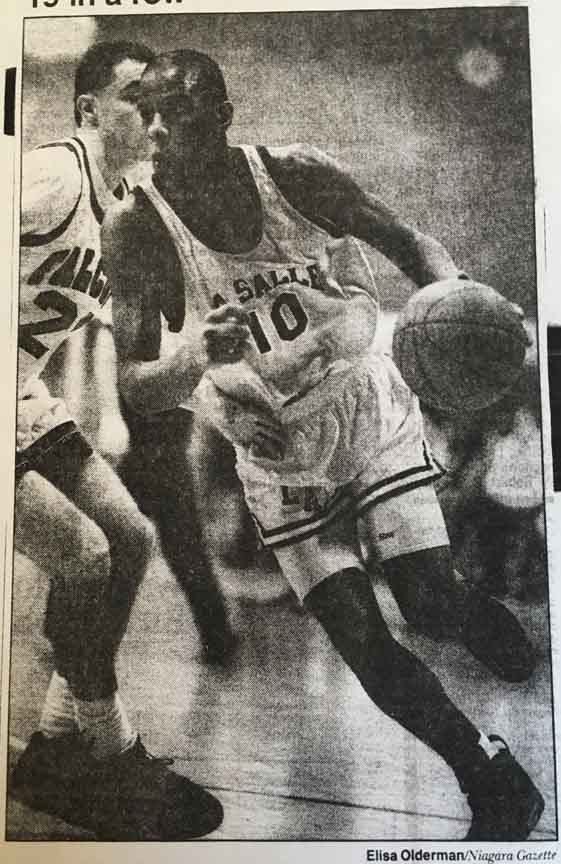
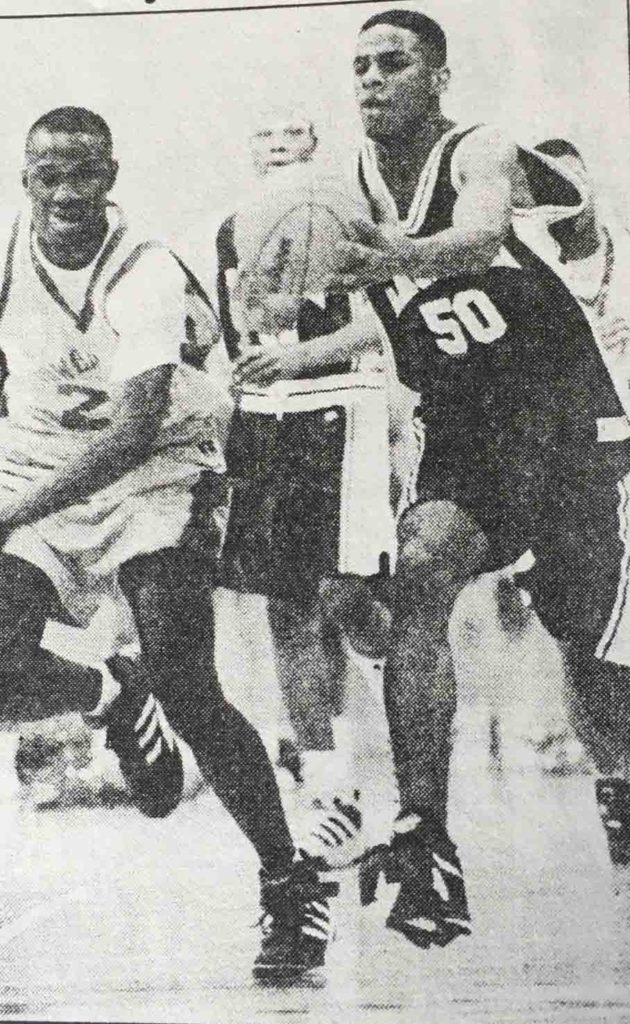
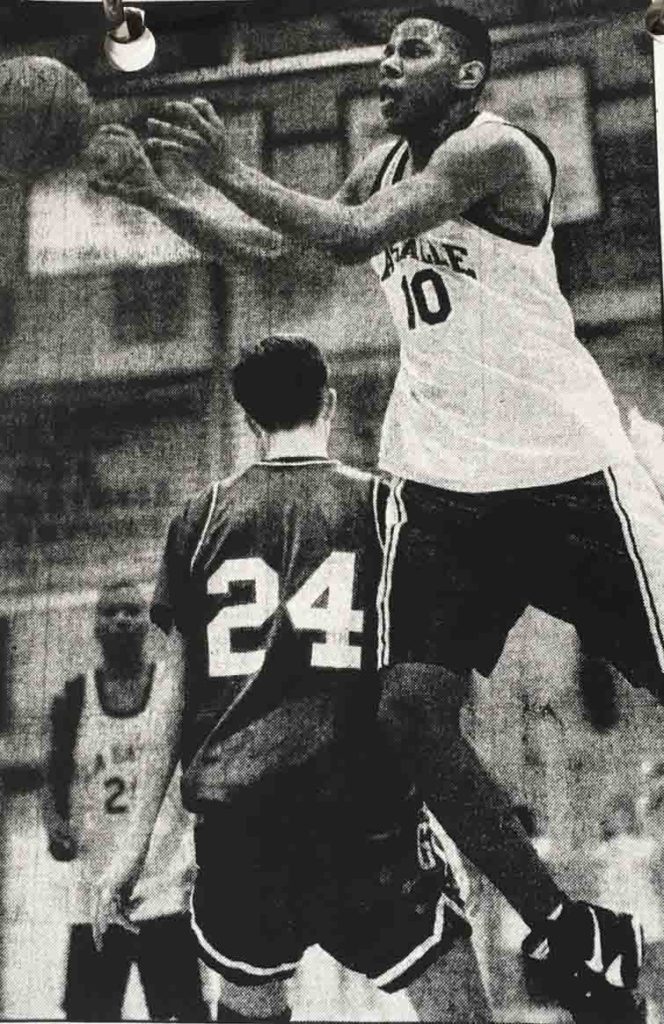
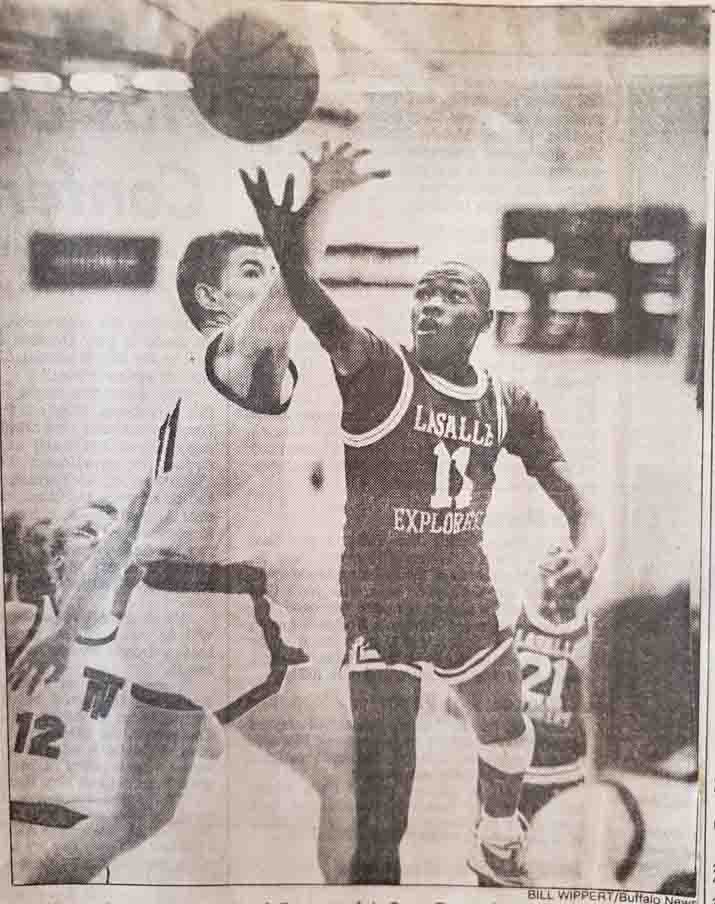
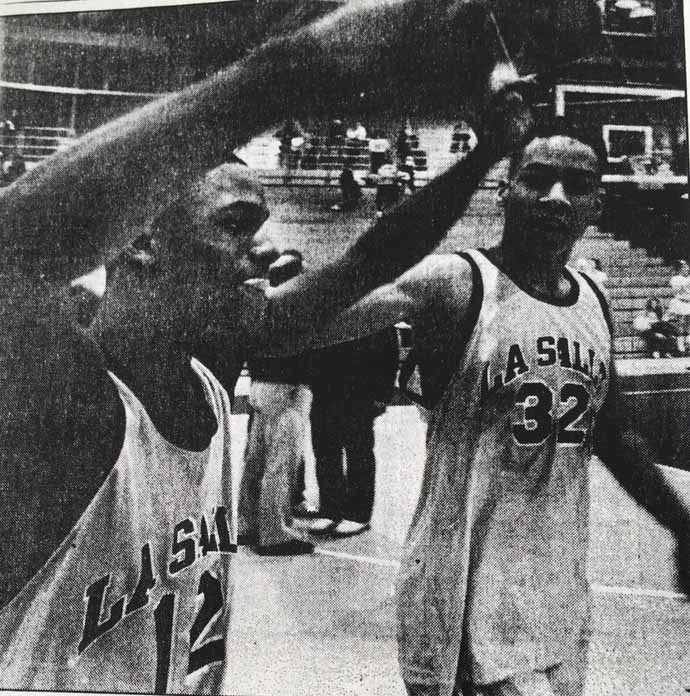
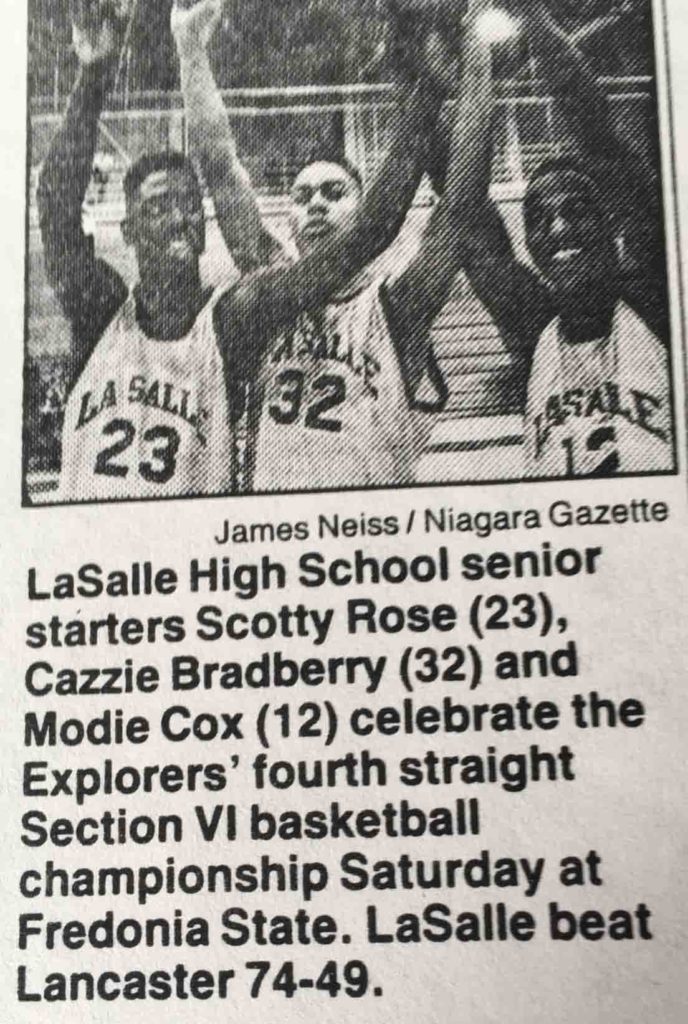
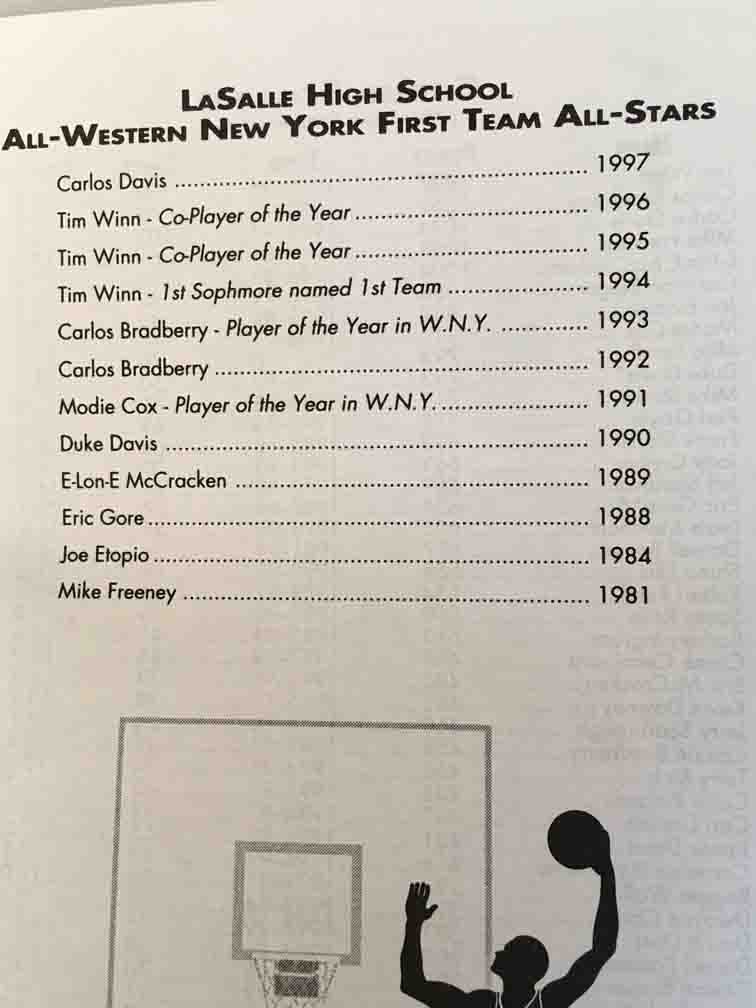
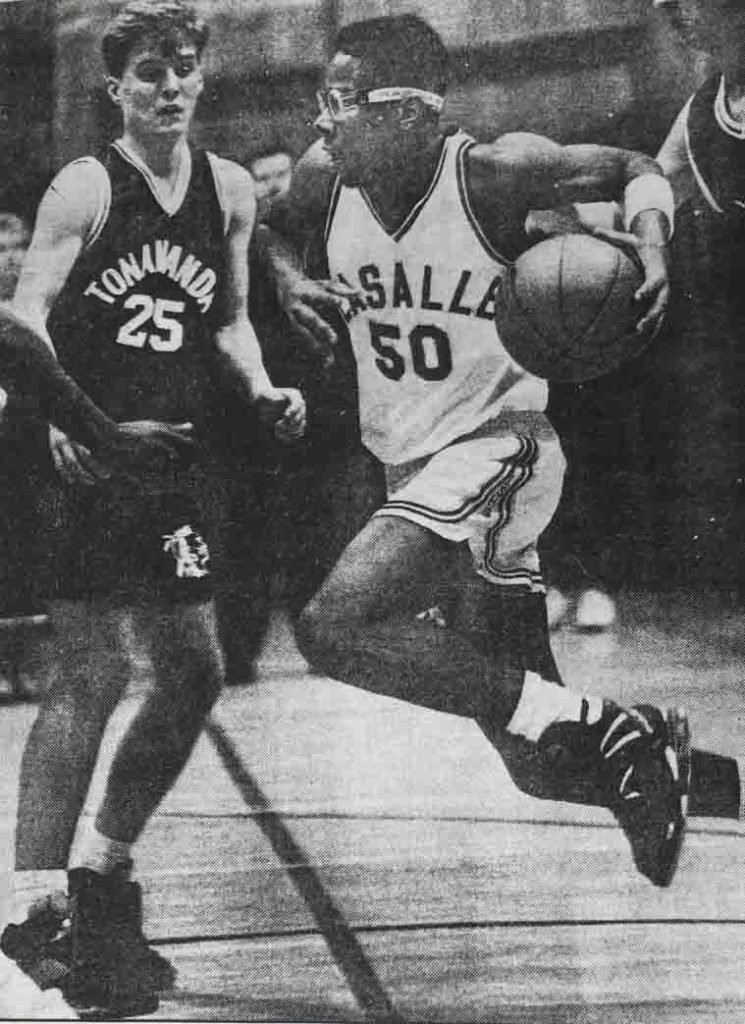
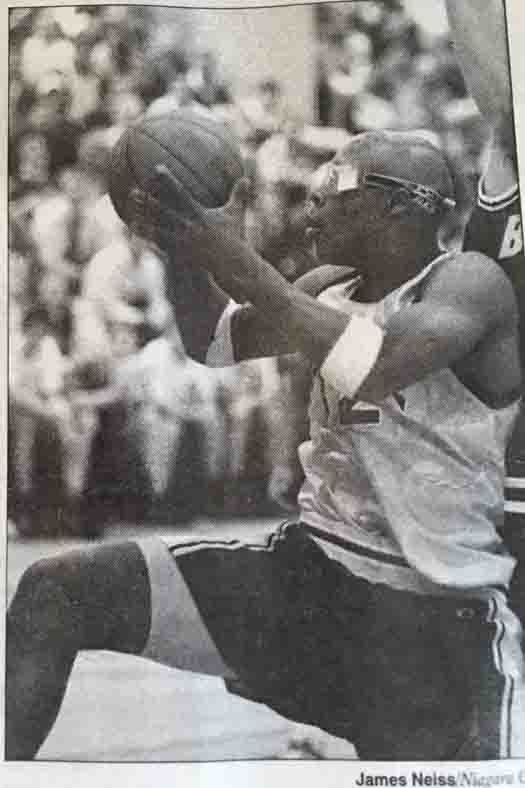

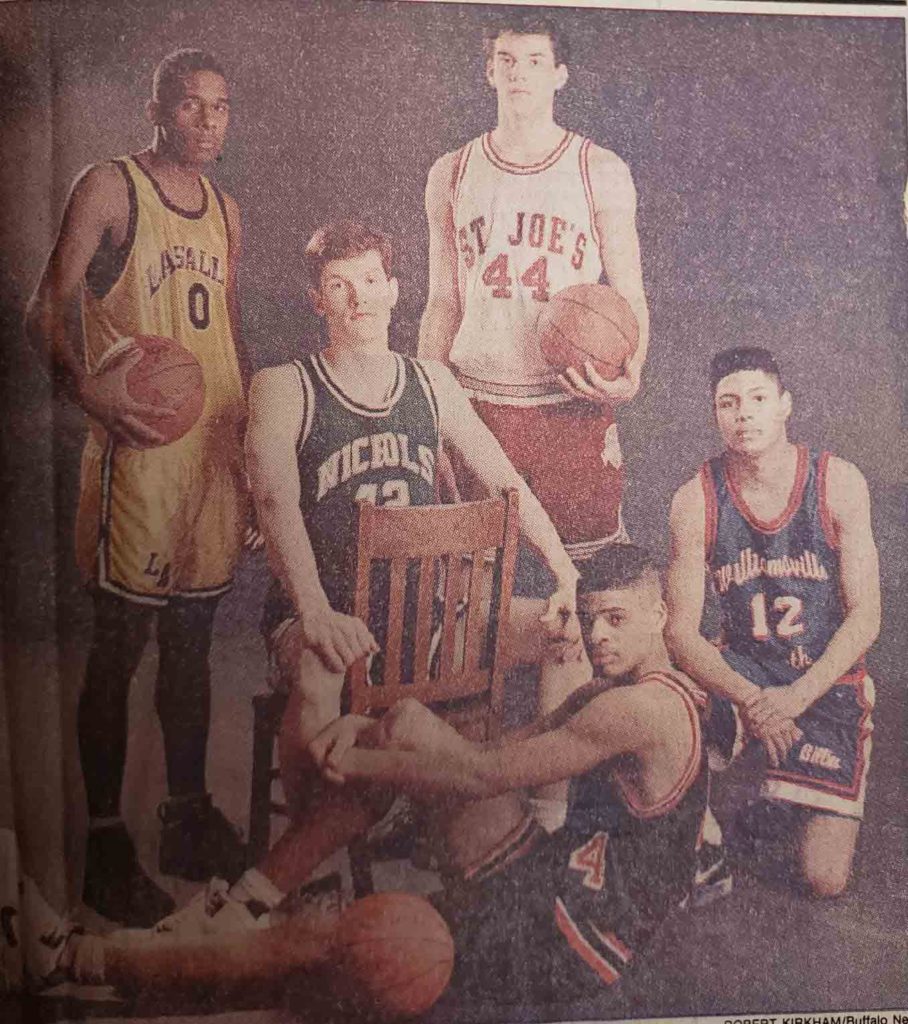
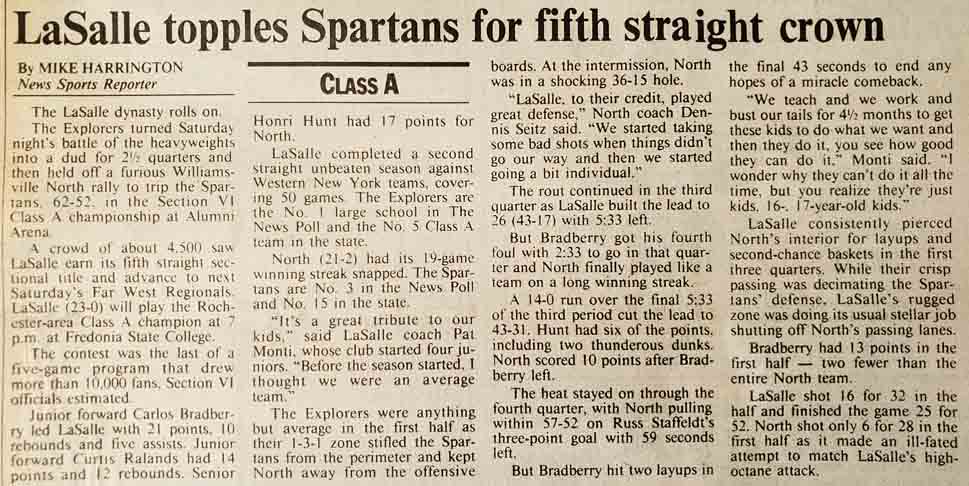
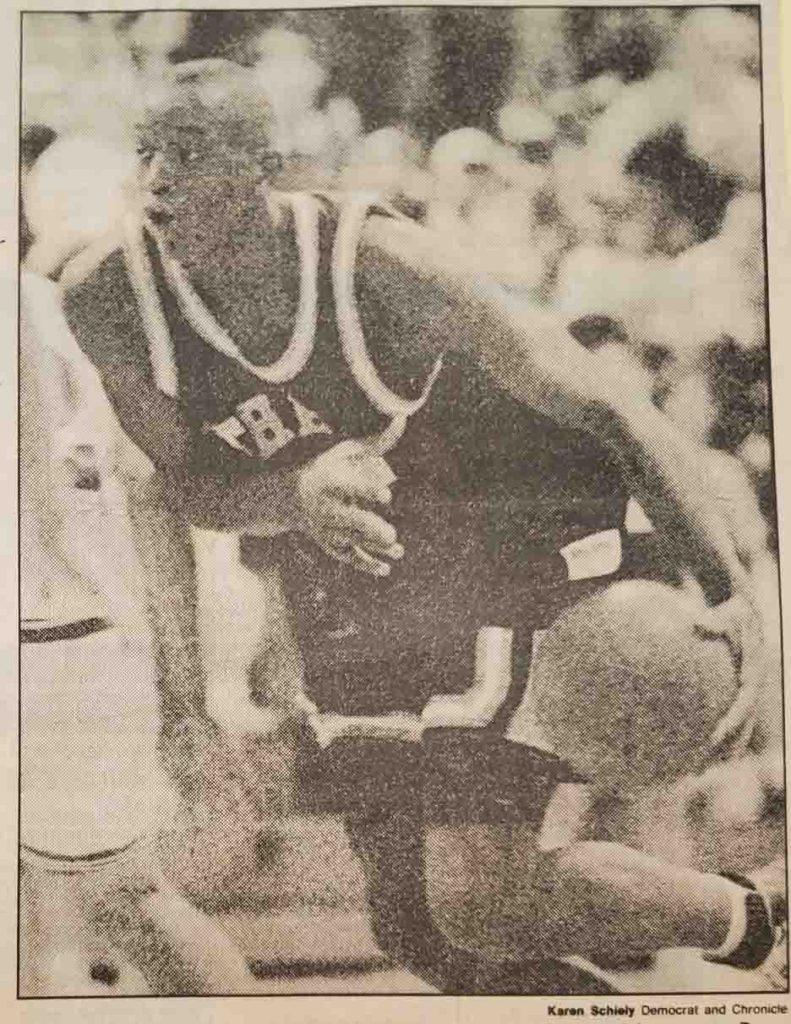
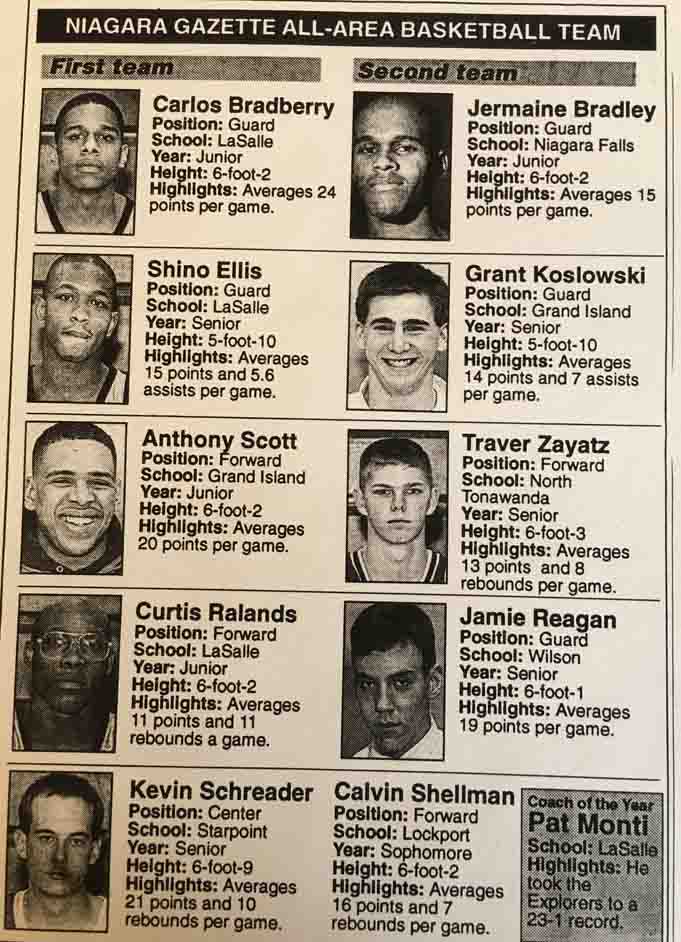


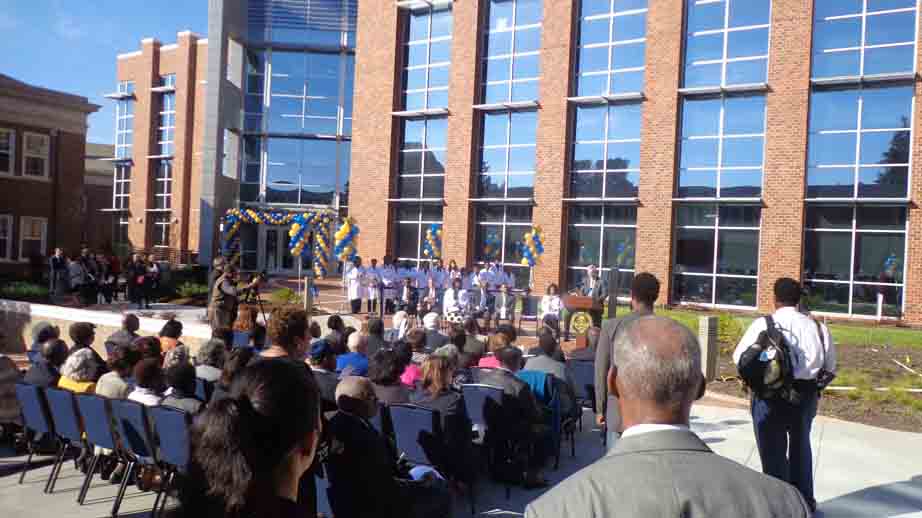


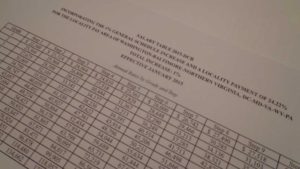 The first
The first 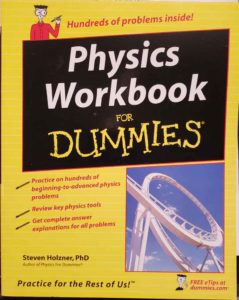 A key
A key  When
When  This is just a piece of Mechanics. There are many more calculations in the: Circuits and Electricity, Dynamics, Kinematics, and Thermodynamics chapters just to name a few. This meticulousness with formulas and units of measure is what
This is just a piece of Mechanics. There are many more calculations in the: Circuits and Electricity, Dynamics, Kinematics, and Thermodynamics chapters just to name a few. This meticulousness with formulas and units of measure is what  Students must become meticulous about the units measure and your calculator must become your ‘best friend’ just like in
Students must become meticulous about the units measure and your calculator must become your ‘best friend’ just like in 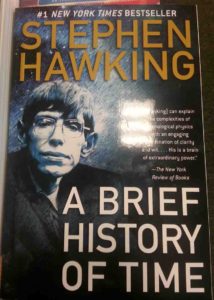 “I want to congratulate you. You’ve really turned things around this year,” my high school
“I want to congratulate you. You’ve really turned things around this year,” my high school 
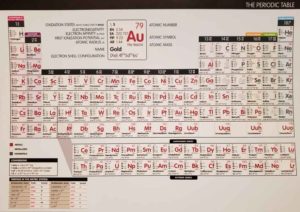 The first
The first  After starting my federal science career, tutoring not only allowed me to supplement my income, but it was a very educational experience for me as well. When applying to work as a tutor through the Northern Virginia Tutoring Service, I listed
After starting my federal science career, tutoring not only allowed me to supplement my income, but it was a very educational experience for me as well. When applying to work as a tutor through the Northern Virginia Tutoring Service, I listed  When working with the students, my initial goal was to approach them with a positive and optimistic attitude. Patience, understanding and a bit of humor were parts of my approach as well. These were particularly important for students who had lost hope. After this initial part, we dove into the actual science and turning their grades around. There were four key principles that I stressed to my students: time management, taking initiative, practice and attention to detail.
When working with the students, my initial goal was to approach them with a positive and optimistic attitude. Patience, understanding and a bit of humor were parts of my approach as well. These were particularly important for students who had lost hope. After this initial part, we dove into the actual science and turning their grades around. There were four key principles that I stressed to my students: time management, taking initiative, practice and attention to detail. Finally, I impressed upon my students the importance of learning to pay attention to several key details.
Finally, I impressed upon my students the importance of learning to pay attention to several key details. 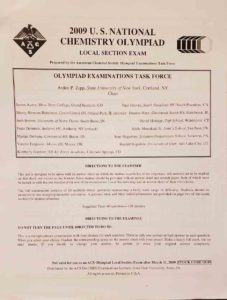 What also helped me out during my tutoring experience was that I could go back and ask one of my veteran undergraduate
What also helped me out during my tutoring experience was that I could go back and ask one of my veteran undergraduate